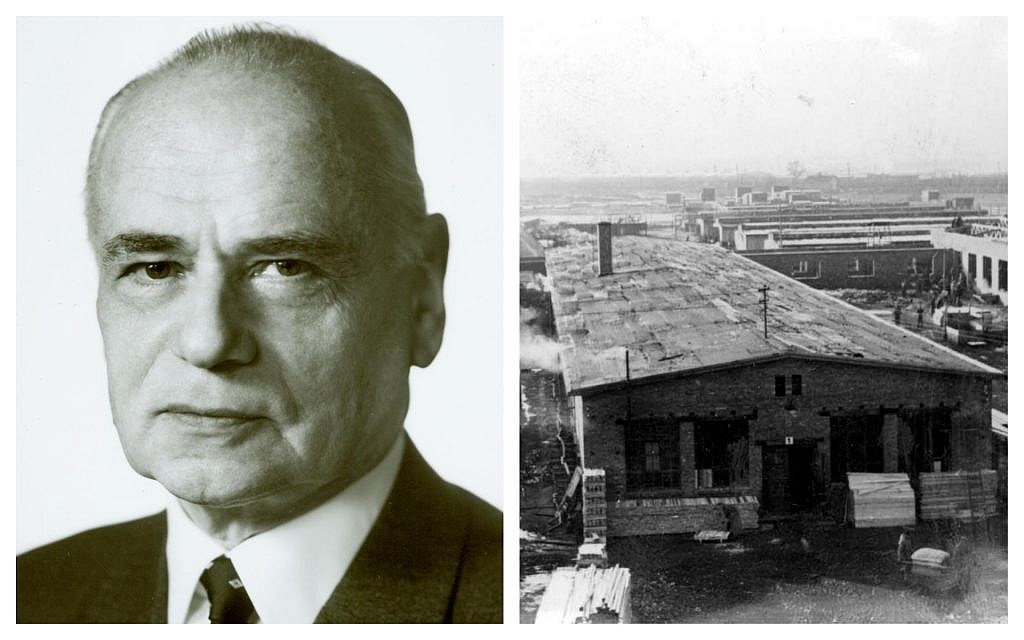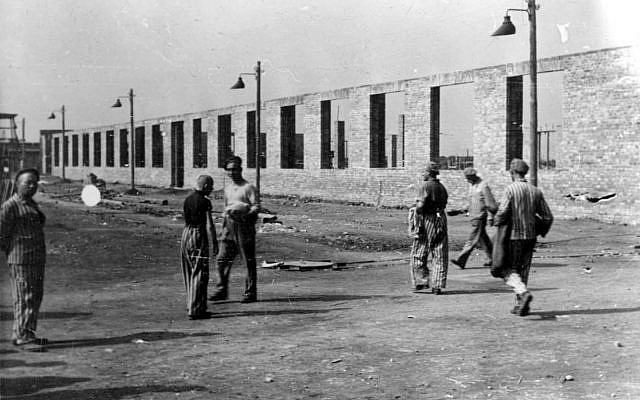After discovery that Victoria Insurance foreclosed on Jewish homes and covered slave labor factories, German university rededicates institute and prize named after Kurt Hamann

WASHINGTON, DC — University of Mannheim in southern Germany is changing the name of a prestigious research institute after it was revealed that the moniker was an homage to the chairman of an insurance company that insured SS-owned slave labor workshops in Auschwitz and other death camps.
The Dr. Kurt-Hamann Foundation will now be called the “Foundation for the Promotion of Insurance Science at the University of Mannheim.” A statement released by the university on December 24 said the name change will become final when approved by the regional government in nearby Karlsruhe, to which the paperwork was being sent.
Hamann, who died in 1981, was the chairman of the Victoria Insurance Company, then headquartered in Berlin, from 1935 to 1968. The Victoria’s senior management had originally included Jews and had actively sought Jewish customers. During the Third Reich, the firm withdrew mortgages from Jews and Jewish-owned companies, including on a Berlin building owned by this reporter’s family. The ownership of the Wolff family building was transferred directly to the Reichsbahn, Hitler’s railways, in 1937.
The name change concludes a campaign this reporter launched in 2013 concurrently with the writing of “Stolen Legacy: Nazi Theft and the Quest for Justice at Krausenstrasse 17/18, Berlin.” The book is about my family’s bid to win restitution of a property built in 1909 by my great-grandfather to house his H. Wolff international fur business.
In 1996, the claim by Heimann Wolff’s descendants was successful, but instead of restitution they accepted financial compensation from the German government. The building, just two blocks from Checkpoint Charlie, is today part of the Federal Ministry of the Interior, Building and Community. In 2016, the German government was further persuaded to put a plaque on the building commemorating its history.

During background research for the claim, it turned out that during World War II, Hamann’s name was listed in a 1944 British War Office booklet entitled “Who’s Who in Nazi Germany.” However, he was not a member of the Nazi Party and had continued as chairman of the Victoria until 1968. Indeed, in 1953 the German government awarded him Germany’s highest civilian honor, the Federal Cross of Merit, for his services.
None of this is mentioned in the December 24 statement by the university, although it states that “Hamann was not evidently antisemitic.”

His record speaks otherwise: During the Nazi era, Hamann also sat on the honorary committee of the House of German Art in Munich, which glorified what Adolf Hitler regarded as proper art. Additionally, he was on a working committee seeking to frame insurance legislation in Nazi terms at the Academy of German Law. At the time, the Academy was led by Hans Frank, who was later executed by the Allies for war crimes.
A landmark book by the late Professor Gerald D. Feldman of the University of California, “Allianz and the German Insurance Business, 1933-1945,” mentioned that Allianz had formed a consortium which included the Victoria to insure facilities at Auschwitz.
It was only by chance during a late-night internet search for anything on “Kurt Hamann” that this reporter discovered the University of Mannheim had established a foundation honoring him in 1979, with an endowment of 173,500 euro ($197,000).
According to the university website, the income “funds academic research in the field of insurance science at the university as well as a Kurt-Hamann prize for the most outstanding dissertations and diploma theses.” One recipient of the prize was Stefan Lippe, who went on to become chief executive of the giant insurer Swiss Re in 2009. This annual prize is also now being renamed.

A 2013 email questioning the University of Mannheim about Hamann received a speedy response that the then-rector, Prof. Ernst-Ludwig von Thadden, was away but would be informed of the inquiry upon his return. In the meantime, the university wrote, an immediate investigation into these allegations would be launched. But it sent no further feedback.
What became of Victoria?
Since a merger in 1997, the Victoria Insurance Company has been part of ERGO, headquartered in Dusseldorf. ERGO describes itself on its website as “one of the major insurance groups in Germany and Europe” operating in over 30 countries. ERGO is itself “part of Munich Re, one of the leading re-insurers and risk carriers worldwide.”
Unlike the Dr. Kurt-Hamann Foundation, the newly named foundation will not be supported by ERGO. The insurance group, which provided members of the board of trustees, is not mentioned in the university’s announcement.
Inquiries to ERGO regarding the merged company’s involvement in the Third Reich elicited the statement: “The Victoria Insurance companies played only a subordinate role as part of the Nazi-controlled economy between 1933 and 1945.”
This ostensibly depends on how one defines “subordinate role.” The Victoria only had a 10 percent share in the consortia insuring slave labor workshops of the SS-owned German Equipment Works (Deutsche Ausrustungswerke, or DAW) in Auschwitz, but it had clearly been part of the enterprise.
Two years after the email to University of Mannheim’s von Thadden — a few weeks after the American Bar Association published “Stolen Legacy” in 2015 — a reply materialized. He said he had read the book and promised to discuss it with his fellow board members of the Dr. Kurt-Hamann Foundation.
“Those were evil times, populated by evil people,” he said. “I do not think that renaming the foundation will be adequate. We must do more.”
Von Thadden also wrote: “Be assured that I am most indebted to you to bring this piece of history to the fore that touches the history of University of Mannheim in this unexpected way. Please keep going.”

In 2016, a paperback edition of “Stolen Legacy” was published, greatly expanded to include further discoveries — including that the Victoria had also been part of a consortium insuring DAW slave labor workshops in the Buchenwald and Stutthof concentration camps.
Israel’s national Holocaust museum Yad Vashem provided wartime photographs of the Victoria-insured DAW facility at Auschwitz from its archives. The trial for accessory to murder of 95-year-old former SS guard at Stutthof Johann Rehbogen was recently put on hold due to Rehbogen’s health.
Von Thadden said he would propose that the foundation be dissolved and remaining funds used to commission a study of Kurt Hamann’s life. The board eventually commissioned a study by the eminent German economic historian, Prof. Johannes Bähr, of Goethe University Frankfurt.
His report has not been made public, but this week von Thadden sent another email.
“I do not think that Kurt Hamann can serve as a role model for young scholars at the University of Mannheim,” von Thadden wrote. “The whole university owes you a debt of gratitude.”
Not only has insurance company ERGO now distanced itself from the name of Kurt Hamann, but it is also dissolving its association with the Victoria business label. The 2017 annual report of Victoria Life says it has stopped taking new business. And in June this year, at the request of ERGO, the Dusseldorf District Council voted to change the name of the square where the ERGO headquarters stands from Victoriaplatz to ERGO-Platz.
In a press statement, Dr. Markus Riess, the CEO of ERGO Group, said: “Victoria is one of the strong roots from which ERGO has grown, and we have evolved successfully from these beginnings… Renaming the square is the right decision at the right time, and it sees us taking a further step into the future.”
As reported by The Times of Israel
